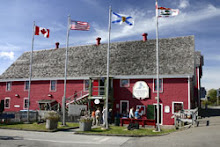
Cod.
For some of us, the word "cod" evokes a series of images that are reminiscent of Kipling’s Captains Courageous. Men working with and against the cold North Atlantic, engaged in backbreakingly hard work. The all important daily catch of fish. The careful salting and preserving of it. The race homeward, to get the best prices and to see loved ones, after months on the Banks.
Around here, the cod were so important that if you said the word "fish", you were actually talking about cod. Lunenburg was at the centre of an economy that saw hundreds of schooners set sail every year and sent thousands of quintals of salt fish to the West Indies. The economy was international and flourished for more than 200 years.
Until the collapse of the fisheries, due to over-fishing and mismanagement of the natural resource, cod were the mainstay of the industry. The expression "Cod is King" was more than just a saying; it was a mantra for a way of life.
Fishing for cod, whether aboard a colonial schooner or in the dories that came later, was hard work. Unlike the thrill of a sport fishery, once you catch your cod you don’t have to fight to bring the fish to you. Cod are normally found within six feet of the bottom. Due to the change in water pressure, the fish immediately loses any resistence. The difficulty, back in the old days, was in the weight of the fish. It was not uncommon to have to haul, by hand, a cod that weighed 100 to 300 pounds ... a complete deadweight.
With the freezing spray of the North Atlantic hitting the fishermen and a good chance of being bathed in a thick fog, fishing for cod was never easy.
The cod were salted in the hold of schooners, like the Fisheries Museum’s Theresa E. Connor, and when the hold was full, they returned home. On land, the fish were dried and carefully preserved. Fish that were landed at Lunenburg in September would eventually find their way to various places, including the West Indies and Portugal, by December or January.
Although the captain, the cook and the mate were all paid in September, the remainder of the crew had to wait until the proceeds from the sail of the salt fish arrived home. This meant that the labours of work from March to September were often not rewarded until February of the following year.
Once the bills were paid, the families of fishermen continued to live their frugal existence.
The stories of fishermen and their families are part of the reason for the Fisheries Museum of the Atlantic. Our retired fishing captains, aboard our schooner Theresa E. Connor and the trawler Cape Sable, share their experiences with visitors. Museum interpretive staff share their knowledge through programmes and conversations. Exhibits chronicle the best of times and the worst of times, from times of prosperity to occasions of losses at sea.
We will always remember.
Wishing you Smooth Sailing,
Heather

No comments:
Post a Comment